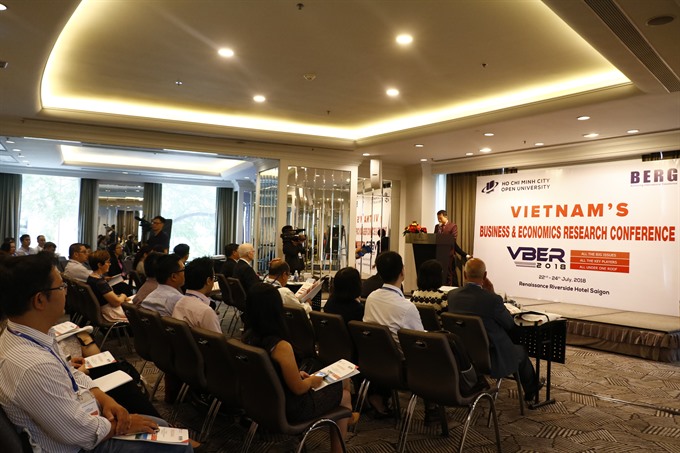 Society
Society

" />Financial development with a focus on financial inclusion for people of all incomes will be the key for stable economic development, Vice Rector of HCM City Open University Nguyễn Minh Hà said at Việt Nam’s Business & Economics Research Conference that ended today (July 24).
 |
| Việt Nam’s Business & Economics Research Conference in HCM City discussed financial development and inequality in emerging markets. Photo courtesy of HCM City Open University |
HCM CITY —Financial development with a focus on financial inclusion for people of all incomes will be the key for stable economic development, Vice Rector of HCM City Open University Nguyễn Minh Hà said at Việt Nam’s Business & Economics Research Conference that ended today (July 24).
Việt Nam is seeing a strong economic growth within the Asia Pacific region, Hà said, adding that it is committed to undertaking economic reforms to integrate into the regional economy.
“Financial development with a particular focus on financial inclusion (or access to finance by the poor) will be key,” he said.
When it comes to economic reform and restructuring, the issues of inequality become very important for consideration by policymakers, he added.
Dr Võ Hồng Đức, head of business and economics research group at HCM City Open University, told Việt Nam News that during financial development, people who can take advantage of opportunities can become rich, and those who fail to grasp those opportunities remain poor, leading to an income gap.
While it is important to develop the economy, life for everyone needs to be better, he said.
Policymakers should issue social policies that reduce income inequality and allow everyone to get access to the benefits of economic development, he added.
Although the Government has tried to reduce inequality, there are still many things to do, according to Đức.
Income inequality remains high, especially between urban and rural areas.
According to Mark Loo of the Concordia University of Edmonton in Canada fintechs could promote financial inclusion in an era of digital transformation.
Many people in ASEAN still live in marginalized areas that have difficulty in accessing banking facilities.
Fintechs manage a broad range of financial services to sustain livelihoods, build assets and manage risks.
They offer opportunities to enhance financial inclusion as more people can access digital banking with increasing internet penetration.
Hạ Thị Thiều Dao, dean of the International Economics Faculty at Banking University in HCM City, said: “Microfinance programmes being carried out throughout the country could take an important role in reducing inequality and increasing access to capital sources for low-income people.”
Institutes which offer these programmes provide loans or receive people’s savings, Dao said, adding that they also provide services which help empower women.
Microfinance programmes can also remove the need for low-income consumers to use “black credit” loans on the black market, she said.
Researchers at the Dublin Institute of Technology and the University of Limerick in Ireland said that microfinance had made significant contributions in developing countries such as Bangladesh, India, and Malaysia.
In developing countries, microfinance has become a useful tool for poverty reduction and enhancement of economic growth and development strategies.
Dao suggested that the Government should create a more detailed legal framework for microfinance institutions to operate.
Việt Nam’s Business & Economics Research Conference was held on July 22-24 by HCM City Open University. Academics, researchers, practitioners and policymakers discussed ongoing research on a wide range of theoretical and empirical issues related to sustainability of economic development in emerging markets, especially for Việt Nam. — VNS




